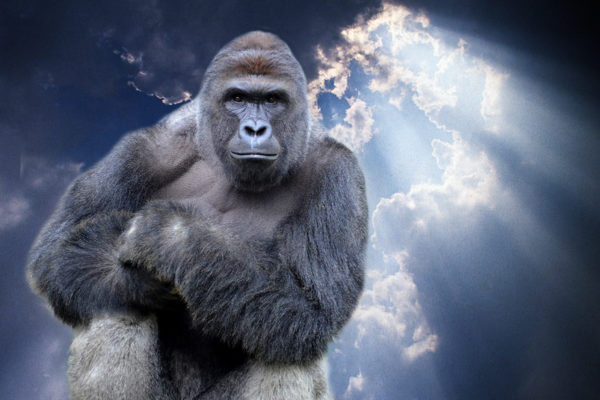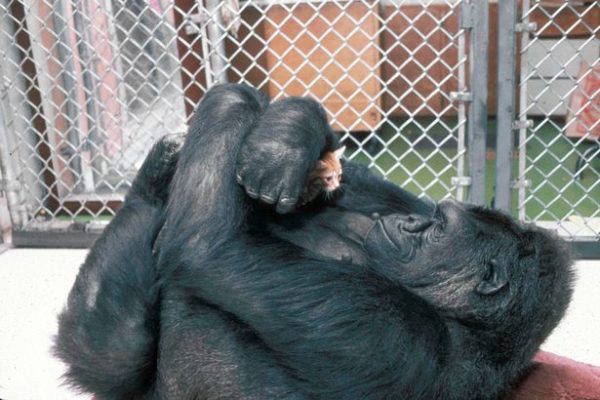Yesterday’s radio show was great. In fact, I think each week, they get better and better! The topic was about the nature of fear and how we can overcome it. Erik went into great detail and shared some very profound insights, so much so that we’re going to continue to talk about this same subject next week. It’s so weird because almost every caller had questions that tied into the subject of fear. The same thing seems to happen every week in that the questions from callers relate to that week’s topic. Maybe Erik is steering me to accept particular people.
If you have tried for months to get on the show with no luck, email me the day before the next one (not now) and I’ll try to help. emedhus@gmail.com. If you’ve already gotten on, in some cases 2-3 times, please consider giving others a chance, too.
Here’s the transcript of our interview with Harambe, the gorilla who was shot by zookeepers some months back after a child fell into the gorilla exhibit.
Kim: Hello.
Me: Hi, Kimberly. How are you doing?
Kim: I’m wonderful. A little chilly, but I’m good. It’s like 50 degrees outside today. How are you?
Me: That is just crazy! I’m doing great.
It’s the middle of June!
Me: How’s my boy?
Erik: I’m great.
He blows kisses with both hands.
Me: I love you baby. Hey, you know what I want to do because of popular demand? And I don’t know if you’re willing to do this, Kim, so just tell me if you’re not. Can we bring in the gorilla, Harambe, for a few questions? He’s the one who took the little boy and was shot.
Kim: Yeah. Yeah.
Erik: First of all, I love you more!
Me: Aw.
Erik: Yeah, we can do that. There’s a lot of peace that needs to be born out of this situation.
Me: Yeah.
Erik: (Shaking his head and making sounds of disgust): There’s been so much negativity born in this, so let’s see the truth in it. Let’s see it for what it is.
Me: Yeah, and maybe we can help people heal with some answers.
Erik: I want to remind people that this is a consciousness. This is a life force. This isn’t just an animal. This is an immortal life force.
Kim (chuckling): He’s getting stern like he’s lecturing!
Erik: There is no hierarchy, people!
Me: That’s what I was going to ask you! They had the choice to shoot him or do something else, and they keep talking about—and I know there’s a lot of controversy around this—that of course a human life is much more important, and you have to save the child. What are your thoughts on that?
Kim: Wow, he’s really intense. I have chills.
Erik: This is really frustrating because this is where we get it all wrong as humans. We think we’re more important, and I’m ready to ruffle a few feathers, but there is no hierarchy and that’s what we keep forgetting. We’re just as equal as the life force of that animal. We’re not better than or lesser than. We’re the same, and that’s what we need to talk about.
Kim: He’s bringing in what feels like a very large, very masculine energy. It’s funny because as this animal, I guess, comes forward or this consciousness comes forward, he’s actually bigger than Erik, his aura, I guess.
Me: Oh!
Kim: His communication is really different. Maybe we can get to that later because I don’t want to waste time, but he’s very still. His energy feels very still.
Me: Well, I want to welcome him. Thank you very much for coming forward. I’m so sorry for your passing.
Harambe: Thank you for seeing my sacrifice.
Me: First I want to ask you, what would you have done to that little boy had they not shot you?
Kim: It’s interesting. He’s talking about the way we view him compared to what he would have done as that type of being.
Harambe: There’s one thing that is common among all beings, no matter what type you are—animal, plant—and that one thing is energy and communicating and feeling through that. You can feel someone’s distress. You don’t need language to understand it. I understood the boy’s distress. I understood that this wasn’t good. I understood it as a situation of trauma for the child, and naturally, my instinct was to—
Kim: He’s showing me an image. I guess the word to describe it is to protect. He’s showing me the image of bringing in and covering.
Me: So, did you want to protect the child from the other gorillas?
Harambe: I wanted to protect and provide comfort. I was unsure of why there was distress and why everyone was freaking out because we didn’t need that response, that emotional response. That’s more of a human thing. I would have brought in and protected [the boy] as if it were my own. (He scratches his head.) Maybe I was a little unsure of what to do with him, but I wasn’t going to cause harm. There’s a common language, and that common language is love. You don’t actually need to speak English to communicate and understand each other. I understood the child was in distress through the emotions he was putting out.
Me: Would you have protected him until the zookeeper came to take him?
Harambe: Yes.
Kim: He keeps showing me that if there were other little, I don’t know what you call them, but like baby gorillas, little cubs or something, he would have brought the child to join them. He keeps showing me that he would have stuffed the kid away to protect him. He shows me putting the little child in a shelter and closing him in.
Me: Aw. So your intention was not to harm him?
Harambe: No.
Me: Well, you were pretty rough with him, though. Do you think you could have unintentionally taken his life? You’re a pretty big animal.
Harambe: That’s very possible. It could have happened. Understanding a situation doesn’t need language, but we do things differently. Even the way we transfer—
Kim: I think he means walk.
Harambe: –is different. The way we carry our young and even feed ourselves is different, so there could have been an injury. (smiling) You are not as durable. You’re not as strong and durable.
Me: Do you have a message for the little boy and the mother?
Harambe: Thank you.
Kim: What exactly are you thanking them for?
Harambe: For the opportunity to send this message and to hopefully show a few things. There’s no hierarchy among life forces. It’s also a perfect example to show how you often don’t observe a situation. You react first. This was an experience you can learn from—see what’s happening first before you react and shoot to kill. Criticism is unfair.
Me: Of the mother?
Harambe points to an image of the mother and child.
Me: Okay.
Harambe: No matter what we go through in life, we all make mistakes. We’ve all been unaware. Those with children have had close calls.
Me: Oh yeah. I have, sure, especially raising five kids. Sometimes it’s hard to, you know, you turn your face for one second and your child is gone.
Harambe: What purpose does it serve to blame the mother and shame her? If you knew that this was part of a contract to teach a big message, would you then blame her or would you thank her for putting herself on that platform to help us learn from this experience? We’re all on the same level so because this happened and because it became well-known doesn’t mean it’s okay to shame her.
Me: So was it a contract? Was it a spiritual contract? Is that what you’re saying?
Harambe: Yes.
Me: To teach parents to put their kids on leashes!
Kim smiles.
Harambe: To teach that there is no hierarchy among life forces. My life is no more valuable than anyone else’s and vice versa, and you’re not a better parent than her just because this happened to her and not you. That’s the biggest message from this. There’s no need for shame and blame. That’s not going to achieve anything. Learn from what truly happened. Take a moment to observe and see what’s happening before you react.
Me: Well, what would you have done if you were the human and a gorilla had taken a child like that understanding that you also said that you could have unintentionally killed the child? There’s always that risk. What would you have done?
Harambe: It would have depended on my conditioning. It would have depended on my beliefs as a human. Some people are raised with complete fear of animals, and some can naturally coexist with them without that fear. So, it depends on perspective, position and views. If I were the human, I can only speak for what I would have hoped for. I would have hoped that I would take the time to see, “Okay, he’s not trying to harm the child. Maybe we could tranquilize instead of take the life.”
Me: But that’s tough because it takes time for tranquilizers to work, and that could have made you very angry.
Harambe: That’s true. There are many options, many ways you could have completed this experience, but the way that it was carried out is what was supposed to happen.
For the contract, I presume.
Me: All right, one more quick question for you. Do you want to say anything to the little boy?
Kim: He’s also saying thank you, very simply.
Me: Okay, and how about to the person who shot you?
Kim: He’s offering a lot of sorrow and remorse.
Harambe: It’s not just that the person is carrying their own blame and guilt. He’s carrying the blame and guilt of the world. So I give thanks, but I also understand the emotions that he’s going through. But the purpose was served, and I’m very grateful.
Me: All right, so basically, you did not have to be shot. Is that the bottom line?
Harambe: No, I didn’t have to be. I could have unintentionally harmed the child, but I was more into understanding the stress in the situation and wanting to protect.
Me: All right. Erik, I have one question for you. If you had been the little boy, what would you have wanted done?
Erik: If I had been that little boy, I probably would have been not paralyzed by fear but paralyzed by the awe of being in the presence of an animal that’s so much larger than me. I would have liked to see that animal live so that perhaps my older self could go back and visit and not only share the importance of safety but also the importance of withholding judgment. This can happen to anybody in many different ways. This just happened to be in a public place and was amplified in the public eye.
Me: Okay, well thank you so much. I know you only recently passed, so thank you so much for coming forward.
Harambe: It’s my honor. Thank you.

What a magnificent animal
It’s been a long time since I’ve reminded you guys to be sure to join the private Channeling Erik Facebook page and the Channeling Erik Prayer and Support Facebook group. When you do, you’ll clearly see that you’ve joined a second family full of insight, humor, love and support. Also, if you haven’t already, go to the right hand sidebar, scroll down, and find the button to “like” the Channeling Erik Facebook page. Thanks in advance, and have a great weekend!

